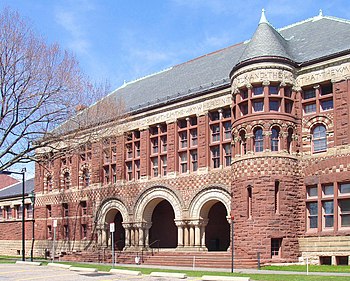| Photograph of front facade, Austin Hall, Harvard Law School, Harvard University, Cambridge, Massachusetts, USA. (Photo credit: Wikipedia) |
Of the 437 schools reviewed, FIRE gave only 4% a "green light" rating (i.e., written university policies do not threaten free expression on campus). Meanwhile, 55% received "red light" ratings, indicating the presence of "at least one policy that both clearly and substantially restricts freedom of speech, or that bars public access to its speech-related policies by requiring a university login and password for access." For those of us who believe that free expression, including the expression of controversial ideas, is central to the mission of higher education, this is disturbing news.
With this context in mind, I ask you to consider the recent article for The New Yorker by Professor Jeannie Suk of Harvard Law School on the toxic effects of the "trigger warnings" movement. Professor Suk writes:
Students seem more anxious about classroom discussion, and about approaching the law of sexual violence in particular, than they have ever been in my eight years as a law professor. Student organizations representing women’s interests now routinely advise students that they should not feel pressured to attend or participate in class sessions that focus on the law of sexual violence, and which might therefore be traumatic. These organizations also ask criminal-law teachers to warn their classes that the rape-law unit might “trigger” traumatic memories. Individual students often ask teachers not to include the law of rape on exams for fear that the material would cause them to perform less well. One teacher I know was recently asked by a student not to use the word “violate” in class—as in “Does this conduct violate the law?”—because the word was triggering. Some students have even suggested that rape law should not be taught because of its potential to cause distress.Imagine that. How are future attorneys supposed to learn about rape law when they refuse to tolerate being exposed to the material? And what are the societal implications of having attorneys who are unprepared to function in such a vital area of the law. How does this possibly serve the social interest? How can this possibly be a good thing for victims of sexual assault who are seeking justice?
Writing about this issue for Reason.com, Robby Soave eloquently blasts this disturbing development in higher education:
It's time to admit that appeasing students' seemingly unlimited senses of personal victimhood entitlement, unenlightened views about public discourse, and thinly-veiled laziness is not merely wrong, but actively dangerous. Colleges are supposed to prepare young people to succeed in the real world; they do students no favors by infantilizing them. But worse than that, by bending over backwards to satisfy the illiberal mob, colleges are doling out diplomas to people who are prepared for neither real life nor their eventual professions. Should medical colleges abdicate their responsibility to instruct students on how to administer a rape kit to a victim, or ask a victim difficult questions about her trauma, because that discussion is triggering to some of the students?As someone working in higher education, I can certainly relate to this frustration. I agree with much of what Soave is saying here, although I'm not inclined to place all the blame on the students. I suspect that the rest of us have at least some responsibility for why they are being raised with these attitudes. But to the point, I have seen how oversensitivity and the conviction that nobody should ever experience hurt feelings can be detrimental to the learning process. This notion of medical students not being trained to administer rape kits is a terrifying prospect that may strike many as farfetched. Sadly, I'm not so sure.
This is a complex problem with few easy solutions. We are already so far down this particular rabbit hole that reversing these trends is not going to be easy. They did not develop overnight and are unlikely to be resolved quickly. That said, I have a few thoughts about where to begin. What I'd like to see is an increase in support for mental health services available to students at our nation's colleges and universities, a reduction in the stigma associated with utilizing such services, and a shift away from institutions indulging students' personal victimhood to one of encouraging them to take active steps toward improving their resilience and developing effective coping skills.
We have a shared social interest in preparing students not just to survive but to thrive. Learning to deal with painful emotions is an essential part of what they should be learning. Ideally, this should start with effective parenting during childhood. When that doesn't happen, we need to make services available and remove the obstacles getting in the way of their utilization.
